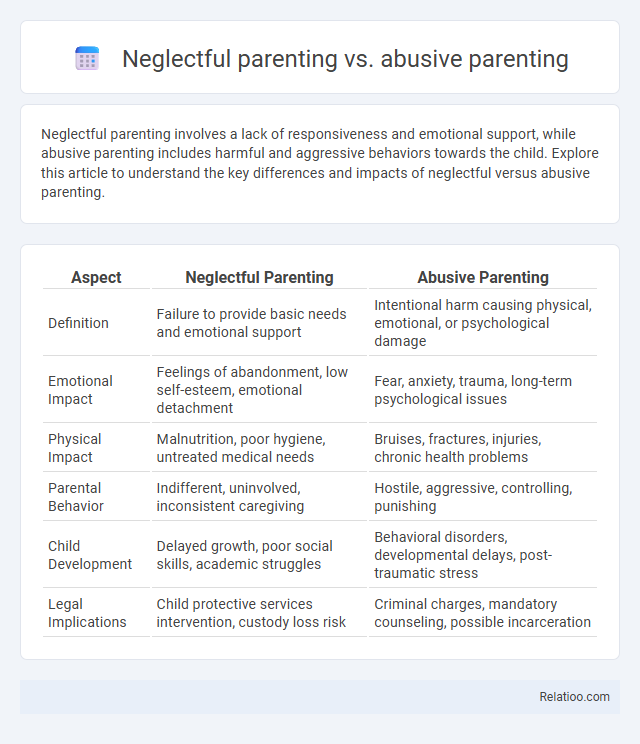Neglectful parenting involves a lack of responsiveness and emotional support, while abusive parenting includes harmful and aggressive behaviors towards the child. Explore this article to understand the key differences and impacts of neglectful versus abusive parenting.
Table of Comparison
| Aspect | Neglectful Parenting | Abusive Parenting |
|---|---|---|
| Definition | Failure to provide basic needs and emotional support | Intentional harm causing physical, emotional, or psychological damage |
| Emotional Impact | Feelings of abandonment, low self-esteem, emotional detachment | Fear, anxiety, trauma, long-term psychological issues |
| Physical Impact | Malnutrition, poor hygiene, untreated medical needs | Bruises, fractures, injuries, chronic health problems |
| Parental Behavior | Indifferent, uninvolved, inconsistent caregiving | Hostile, aggressive, controlling, punishing |
| Child Development | Delayed growth, poor social skills, academic struggles | Behavioral disorders, developmental delays, post-traumatic stress |
| Legal Implications | Child protective services intervention, custody loss risk | Criminal charges, mandatory counseling, possible incarceration |
Understanding Neglectful Parenting
Understanding neglectful parenting involves recognizing a pattern of inadequate care and emotional detachment where a caregiver fails to provide basic needs such as food, shelter, supervision, and emotional support. Unlike abusive parenting, which actively harms a child through physical, emotional, or verbal violence, neglectful parenting is characterized by passive omission, leading to developmental delays and increased risk of mental health issues. Identifying neglect is crucial for early intervention, as prolonged neglect can cause irreversible cognitive and emotional damage distinct from the trauma caused by direct abuse.
Defining Abusive Parenting
Abusive parenting involves intentional actions that cause physical, emotional, or psychological harm to a child, distinguishing it from neglectful parenting, which is characterized by the failure to provide basic needs and adequate care. While neglectful parenting results in harm through omission, abusive parenting inflicts damage through direct and deliberate mistreatment or violence. Understanding these differences helps you identify the specific signs of abuse, ensuring timely intervention and protection for the child.
Key Differences Between Neglectful and Abusive Parenting
Neglectful parenting is characterized by a lack of responsiveness and emotional support, resulting in unmet basic needs such as food, shelter, and supervision, whereas abusive parenting involves intentional harm through physical, emotional, or sexual violence. Neglect primarily causes developmental delays and emotional detachment due to deprivation, while abuse leads to trauma, fear, and long-term psychological damage caused by active mistreatment. The key difference lies in neglect being a passive failure to provide care, while abuse is an active behavior intended to cause harm.
Common Signs of Neglectful Parenting
Common signs of neglectful parenting include consistent failure to provide basic needs such as adequate food, shelter, clothing, medical care, and supervision. Children experiencing neglect may exhibit poor hygiene, frequent absences from school, developmental delays, and emotional withdrawal. Unlike abusive parenting, which involves harmful actions, neglectful parenting is characterized by omissions and lack of attention, resulting in long-term physical, emotional, and cognitive consequences for the child.
Common Signs of Abusive Parenting
Common signs of abusive parenting include frequent yelling, harsh physical punishment, and consistent emotional cruelty or neglect that severely impacts a child's well-being. Abusive parents often display controlling behaviors, intermittent affection coupled with severe discipline, and a lack of empathy toward their child's needs. Unlike neglectful parenting, which is characterized by inattention and lack of supervision, abusive parenting actively harms the child through physical or emotional aggression.
Impact on Child Development
Neglectful parenting significantly hinders a child's emotional and cognitive development by failing to provide necessary attention and support, leading to attachment issues and poor academic performance. Abusive parenting inflicts trauma through physical, emotional, or verbal harm, causing long-term psychological disorders such as anxiety, depression, and behavioral problems. Your child's development is deeply affected by these adverse environments, potentially resulting in difficulties forming healthy relationships and achieving emotional stability.
Short-term and Long-term Consequences
Neglectful parenting often results in short-term consequences such as developmental delays and poor academic performance, while long-term effects include attachment disorders and increased risk of mental health issues like depression and anxiety. Abusive parenting causes immediate physical injuries and emotional trauma, with persistent long-term impacts including chronic PTSD, impaired emotional regulation, and higher likelihood of substance abuse. Both neglectful and abusive parenting severely disrupt a child's emotional and psychological development, but neglect primarily undermines the opportunity for healthy growth, whereas abuse inflicts direct harm and fear.
Factors Contributing to Neglectful and Abusive Parenting
Factors contributing to neglectful and abusive parenting often include parental substance abuse, untreated mental health disorders, and chronic stress stemming from financial instability or lack of social support. Childhood trauma experienced by parents can perpetuate cycles of neglect and abuse, impairing their ability to provide adequate care and emotional support. Environmental factors such as community violence and inadequate access to parenting resources further exacerbate the risk of both neglectful and abusive behaviors.
Prevention Strategies and Interventions
Prevention strategies for neglectful parenting focus on early identification through regular home visits and parental education programs that emphasize child development and basic caregiving skills. Interventions for abusive parenting prioritize safety planning, therapy for both the child and the parent, and, when necessary, legal action to remove the child from harmful environments. Collaborative efforts among social services, healthcare providers, and community organizations enhance the effectiveness of prevention and intervention by addressing underlying risk factors such as substance abuse, mental health issues, and poverty.
Supporting Children and Families at Risk
Neglectful parenting involves a failure to provide basic emotional or physical needs, often leading to developmental delays and psychological issues, while abusive parenting includes harmful actions like physical or emotional violence that severely impact a child's well-being. Supporting children and families at risk requires early intervention programs, counseling services, and community resources focused on improving parenting skills and ensuring children's safety and health. Your involvement in recognizing signs of neglect or abuse and seeking professional support is crucial to fostering a safe, nurturing environment for vulnerable children.

Infographic: Neglectful parenting vs Abusive parenting
 relatioo.com
relatioo.com